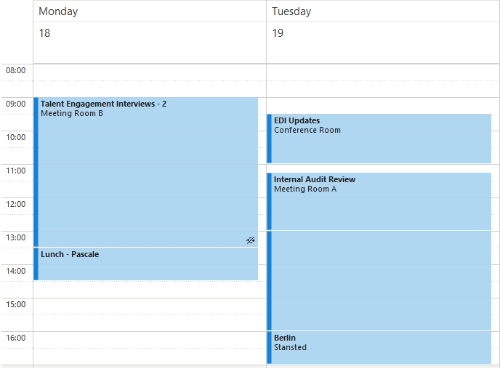Arrangements vs Intentions (B2-C1)
Understanding arrangements as contracts is an effective way to help you choose the most appropriate future form.
Before we can put a meeting or appointment in our diary, we need to check that the date, time and place is possible for someone. If they agree to meet us, we have an arrangement, which means that they now expect us to be somewhere at a specific time in the future.
We use the Present Continuous, not will, to talk about arrangements.
Claire:
Are you free on Monday, Elaine?
Elaine:
Er, let me just check. I'm interviewing until half one and then I'm meeting Pascale for lunch. How about three?

In short, an arrangement is like a contract, in which two parties (for example, Elaine and Pascale) have made an agreement with each other to do something in the future - in this case, to meet for lunch. The agreement between both parties makes the arrangement fixed and it's definite for the future, or it has to be cancelled.
Other types of arrangement
Bookings, of course, are also a form of contract. When you book plane tickets, for example, you have an arrangement with an airline to provide you with a flight, which is why Elaine can also say:
I'm driving to Stansted airport on Tuesday afternoon and I'm flying to Berlin at four.
Not all arrangements are in our diaries
Tasks that have been agreed between third parties may not be in our diaries, but they're still arrangements. Let's say it's now Monday 18th and Elaine says:
Claire, can you remind me to move my car before I go to lunch? I think the contractors are coming to cut the grass this afternoon.
In this case, some work has been agreed, probably between the facilities manager where Elaine works and a landscaping company, but it doesn't need to be in Elaine's diary. She's talking about someone else's arrangement.
Let's look at another example on Monday 18th.
Claire:
Are you doing anything special tonight?
Elaine:
No, not really. I'm just packing for my business trip.
In this example, Elaine's unlikely to put an appointment in her diary for packing her suitcase. Here, she's treating a personal plan like an arrangement, which she sees as fixed for that evening. Perhaps we could say she's arranged this with herself, a bit like a personal contract.
I'm just going to pack for my business trip, would also be possible.
In this case, it really depends on how definite the speaker views the future action. However, using the Present Continuous when it's clear that something has been agreed and is now expected in the future, is a helpful rule to follow.
Interested in learning more?
Let's say that Elaine would like to do some shopping and says: I'm going to buy a new suit at the weekend for my business trip.
This sentence describes an intention - something she's already decided that she wants to do in the future.
Using I'm buying in the Present Continuous here would make the action definite, which doesn't fit well because when she goes shopping, she may not find anything suitable that she wants to buy.
For intentions, use be + going to + base form.